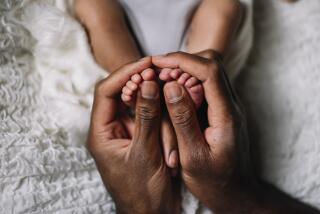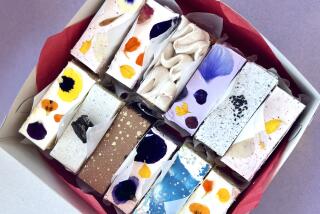A Grandmotherly History Is Soaked Into Her Fruitcake
- Share via
My grandmother must be feeling a lot of holiday good will. She hasn’t thrown a bedpan at a nurse or told a doctor to kiss her derriere since Thanksgiving. She seems to be adjusting to life in a New York nursing home at just the time of year I’d expect her to be most recalcitrant. I am worried.
When I was growing up, the late fall days that led into Christmas usually began with her raucous rattling of cake pans in the kitchen about 5 a.m. If she was up, you should be up. “Tide and time wait for no man,” she would bellow, rousing the house like a West Indian drill sergeant if we weren’t down for breakfast by 7. She wanted that kitchen clear for baking. She had fruitcake orders to fill.
What a pain on a Saturday morning. But what a voice to rise to: The sun and the Queen were in every word.
By the time I had hit the kitchen, she was in high gear: burning sugar, dicing currants, pouring out the extra-proof rum--sipping the extra-proof rum. Be aware: this is not the pale, dry, maraschino-cherry-pocked cake Americans know. This is a traditional West Indian fruitcake--a dark, moist confection, liquor-soaked. And an exquisite variation of it at that.
I’ve been to more than a few West Indian celebrations where the fruitcake offered was a dry, crumbling thing not worthy of the name. At these gatherings, the members of my family would take a bite then exchange smug glances:
nothing like Ruby’s, we’d agree telepathically.
What Ruby Hyacinth Duncombe Lord made was the culmination of a months-long ritual. The raisins, the prunes, the currants and the citron would be soaked in a half gallon of port wine and a pint of rum for at least three months in a dark place. Even after the cake was baked, port was poured on it regularly to preserve and keep it moist for months. When you bit a piece, the fruits spit back liquor at you.
More specific about the recipe I can’t be. When my grandmother came to the United States from Jamaica in 1918, she promised her oldest brother that she’d never give the recipe to anyone outside the family. Wealthy Americans, for whom she worked as a housekeeper and cook, tried to buy it from her so they could sell it commercially.
“Never,” she said. It wasn’t just the pact with her brother. The coveted formula was one of the few family treasures she still possessed in America. She was not a pampered Creole princess here. And in Jamaica, her place of privilege was severely circumscribed by a colonial color-caste system. Her Afro-Asian-European family isolated itself from the black majority but was unable to attain any real power under British colonial rule.
In the United States, she pinned all her hopes on a soon-to-be physician from Guyana--my grandfather. But he divorced her in the midst of the Depression, left her with four children and married a younger woman. Grandmother was not without resources, however. She had a good education and an upper-class Anglo-Jamaican accent. The former was of little significance in America. But the latter, combined with her color and talent in the kitchen, qualified her as an exotic variation of the colored housekeeper/cook. She was welcomed in the homes of doctors and lawyers in Greenwich Village for a while. But rich people fall on hard times, too. Grandma was out of work. She and her four children went on the relief rolls. To make extra money, she sold her fruitcake for weddings and holidays.
Perhaps grandmother could have done more with her life, despite the profound and pervasive racism that defined America most of her 88 years. My mother always felt so. Spoiled and lazy were words family members often used to describe Ruby. A con artist, too. As an adult, I have seen Ruby play both ends against the middle, with cash as the reward. But as a child, I thought she could do no wrong.
She lived with us most of my early childhood and took care of me while my mother worked. Our afternoons were often spent listening to “Our Gal Sunday” and “Helen Trent” in the waning days of radio soap operas. When our television came, a new ritual ensued. Grandma would put down the wash and sit with her feet in a tub of hot water I prepared. Then I’d rub her corns with a pumice stone while she watched “As the World Turns.” When the Oxydol commercial ended the half-hour drama, I’d dry her feet and smooth on the almond-scented lotion we both loved.
When I was 8, we left the Brooklyn neighborhood where my family lived. For many complicated reasons, I saw less of my grandmother when we moved to Manhattan. When we were together, there was little time for soap operas. I was a big girl by then and had a full day of school. But we did catch late afternoon reruns of the “The Millionaire,” and swore that only the other would share the wealth John Beresford Tipton was going to bestow on us any minute. I was 10. Grandma was nearly 70 and still earnestly dreaming of gifts from unknown and benevolent hands.
After “The Millionaire,” Grandma might give me a quarter from the fruitcake money she saved and send me to Terry, the neighborhood number runner. I’d hand him a piece of paper and instruct: “Grandma said to play a combination.”
In another time, Grandma might have made a bundle with her fruitcakes. Look at Famous Amos.
On the days I’m fed up with journalism, I entertain the idea of going into business for myself and selling Grandma’s fruitcake. I’d put it in a fancy ruby-red tin with a picture I saw of her once on top: She was standing regally erect, her hourglass figure wrapped in an ankle-length white dress, circa 1919. The cake tin would read: Duncombe-Lord “The World’s Finest Traditional West Indian Fruit Cake.” You’d have to order it through Bloomingdale’s or Neiman-Marcus. Grandma would like that.
I called her recently. We hadn’t spoken in almost a month. Worse, I had not been to New York to see her since she was put in a nursing home last April.
“Oh, I’m so glad to hear from you,” she said. Her voice was weak and full of gravel.
“How are you feeling?” I asked.
“Oh, the same old, same old,” she said, then began to tell me the latest family gossip, her voice getting stronger the juicier the tidbit.
“I lost the fruitcake recipe again,” I told her.
“Whaaat!” she said indignantly, then chuckled.
It was the third time in two years. I bet Grandma thinks its deliberate. “OK,” she began, “you put your fruits down in advance . . . then you use a tablespoon of--”
“What kind of spoon?,” I asked. “Like the big silver serving ones from Jamaica or a--”
“Yes, yes, like your great-grandmother’s spoon,” she said.
And of course my great-grandmother’s spoons led to talk of other things. After a half hour, I was only halfway through the recipe. But I learned that Grandma is going back to the Catholic church--she likes the nursing home priest; and which relative has a new mistress.
I checked my recipe notes. “You forgot to tell me how much flour to use and when to put it in.”
She told me.
“And what about--”she cut me off.
“You’re not going to make the cake now, are you?” she asked.
“No, but I want the recipe now so I can have it in case I make it sooner than I plan.”
“Please,” she said laughing, “I ain’ able with you sometimes. You know you’re foolish?”
I didn’t want her to stop, of course. She will be 89 this month. I will have to walk into that nursing home soon. But until I see her, and between the times I do, I need these conversations. I need to hear her voice and the nine decades of crust hanging on it. It keeps me connected to her and people and things I never knew.
“Didn’t you make this cake before?” she asked.
“Yes, and it came out just like yours, but that was a long time ago. I don’t remember everything I did.”
“If it came out once, it will come out fine again,” she said gently. “Just call me if you fall by the wayside.”
More to Read
Eat your way across L.A.
Get our weekly Tasting Notes newsletter for reviews, news and more.
You may occasionally receive promotional content from the Los Angeles Times.










